ImpactEd have produced a report that draws on evidence from 62,000 students across Key Stage 2, 3 and 4 (KS2, KS3, KS4). You can read the full report here.
In partnership with the University of Bristol, ImpactEd monitored, surveyed and interviewed students over a seven month period between May and November 2020. The aim of this study was to assess the impact of the pandemic on students. The study uses a range of surveys to look into student wellbeing; the level of their anxiety and the impact on their learning; and measured academic (and social) persistence and resilience. The surveys also looked at remote learning outcomes for students and support received from teachers; and support received from parents, access to devices and spaces to learn at home; self-reflection on their learning.
Key Findings
During the first period of remote teaching, pupil wellbeing was stable.
The pre-lockdown pupil wellbeing score was 23.6. Pupil wellbeing was measured using survey data and put into a scale of 1-35. Using that same method,the average score was 23.8 in May, 24.1 in June and 24.0 in July.
The qualitative data alongside this suggests that many pupils noted the time away from being physically at school allowed them to build healthier and better relationships with their parents, having much more meaningful conversations about mental health.
The report found only 23% of pupils wanted dedicated time to support wellbeing when they returned to school, compared to the 56% who specified not having lots of pressure to catch up on learning would be beneficial upon their return to school.
Across remote learning in 2020, challenges were felt much more strongly by pupils from disadvantaged backgrounds.
The report measures disadvantage as those eligible for the Pupil Premium. When assessing student’s learning during lockdown, those on the Pupil Premium reported the worst outcomes; only 45% of students eligible for Pupil Premium said that they understood their school work in lockdown and they are more likely to be worried about falling behind on their school work as a result of Covid-19 than their non-eligible peers.
Pupils from disadvantaged backgrounds scored 5% lower on questions about their resilience, compared to pupils who were not eligible for Pupil Premium. They were also more less likely to have developed a routine for learning and less likely to be able to get help from their family.
Whilst disadvantaged students were only 2% less likely to have a device than their better-off peers they were more likely to have to share a device within their household. As a result of the factors above their home learning environment score was 6% lower than their better-off peers.
Throughout 2020, pupils in Year 10 and 11 experienced the greatest challenges with motivation for learning.
Compared to KS3, pupils studying for their GCSEs scored consistently lower in terms of remote learning engagement and help from parents and teachers between June and November 2020.
Of those in KS4:
- 3 in 20 said they didn’t understand the work being set;
- 1 in 4 couldn’t get help at home;
- 1 in 5 couldn’t get help from teachers.
In terms of routine, the report found that 40% KS4 pupils said that they didn’t have a routine which helped them learn, compared to 32% of KS3 and 31% of KS2.
GCSE students and girls experienced greater anxiety about returning to school and more anxiety while in school.
On the topic of returning to school, anxiety was a major issue for year 10 and year 11 students. The report found that 33% of girls were concerned about returning to school; on average, girls reported 10% higher anxiety than boys, reflected in lower wellbeing scores for girls.
Young girls were more likely to be concerned about bringing Covid-19 home to their families upon their return to school, but pupils did note the wiping down of desks and other measures reassured them whilst they attended school.
Pupils who had struggled the most during lockdown were not always those identified as vulnerable pre-Covid-19.
ImpactEd gave teachers access to individual wellbeing and learning data of their pupils; teachers reported that the data identified children who they may not have immediately thought of as vulnerable and allowed them to adjust to their needs more easily.
Pupils who were struggling during lockdown were less likely to be excited about going back to school, with concerns over missed work and the pressure of ‘catching up’ on missed learning time.
Overall,primary school pupils were more excited about returning than secondary school pupils. However, the report found that the impact of lockdown can vary significantly in different contexts; particularly demographic intake of a school. For this reason the percentage of those excited about returning to school had a wide range; in individual primary schools the range was 42% to 88% and in individual secondary schools the range was 16% to 81%.
Recommendations
The recommendations of this report were aimed at schools:
- Wellbeing strategies should focus on the positives of individual experiences as well as the challenges. Where support is needed, pupils may benefit more from a targeted approach to wellbeing rather than universal interventions.
- Post-lockdown support should be carefully evaluated to ensure that pupils who come from economically disadvantaged backgrounds are benefiting. If interventions are not having the desired effect, they should be stopped
- Pupils studying for exams reported lower wellbeing scores and have had more challenges engaging with school work. Teachers should emphasise intrinsic motivation for learning as they navigate uncertainty around assessment arrangements.
- Schools should consider whether girls may need more support in managing their anxiety. For both girls and boys, consistent routines for learning and opportunities for teacher-pupil interaction were seen as beneficial for wellbeing
- Schools aiming to understand pupil learning and wellbeing needs should look for manageable ways to gather data from pupils themselves as well as from teacher observation. Where possible, they should use validated measures to reliably identify pupils who struggled during lockdown and to assess the impact of support.







